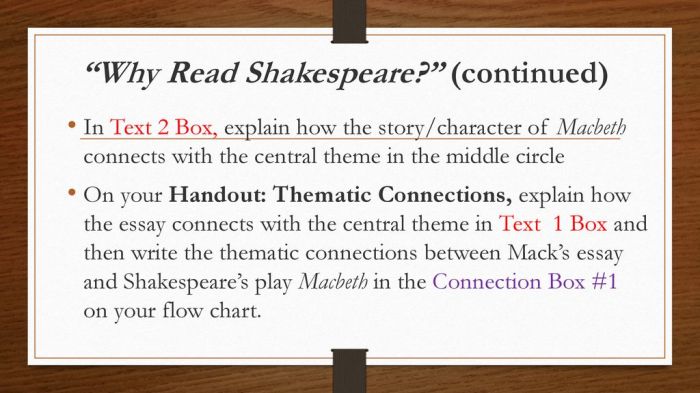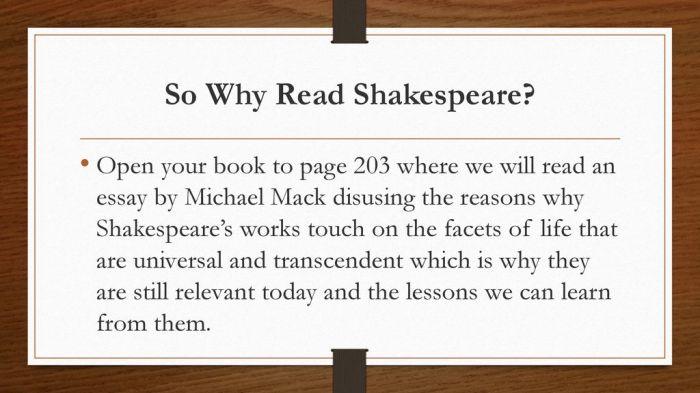Why read shakespeare by michael mack – In his compelling article, “Why Read Shakespeare?”, Michael Mack, an esteemed Shakespearean scholar, eloquently presents the enduring significance and transformative power of Shakespeare’s works. Mack asserts that reading Shakespeare offers invaluable educational, aesthetic, and practical benefits that enrich our lives and broaden our understanding of the human condition.
Throughout history, Shakespeare’s plays and sonnets have transcended time, captivating audiences with their universal themes, relatable characters, and exquisite language. His works continue to inspire, challenge, and entertain readers of all ages, proving their enduring relevance in contemporary society.
Introduction
In his insightful article “Why Read Shakespeare?,” literary scholar Michael Mack presents a compelling argument for the enduring relevance and profound value of Shakespeare’s works in contemporary society. As a renowned expert in Shakespearean literature, Mack offers a unique perspective on the significance of Shakespeare’s plays, poems, and sonnets.
Mack’s central thesis is that reading Shakespeare enriches our understanding of human nature, broadens our cultural horizons, and fosters a deeper appreciation for language and literature.
Shakespeare’s Enduring Legacy
The works of William Shakespeare have transcended the boundaries of time and continue to resonate with audiences today. His plays and poems explore timeless themes that remain relevant to human experience, such as love, loss, ambition, and the nature of good and evil.
Universality of Shakespeare’s Themes and Characters
Shakespeare’s characters are not confined to a particular time or place. They represent universal human emotions and motivations. His plays explore the complexities of the human condition, and his characters’ struggles and triumphs mirror our own. Whether it’s the tragic love story of Romeo and Juliet or the ambitious rise and fall of Macbeth, Shakespeare’s characters have a universal appeal that transcends cultural and linguistic barriers.
Influence on Modern Culture, Why read shakespeare by michael mack
Shakespeare’s influence on modern culture is immeasurable. His works have been adapted into countless films, television shows, operas, and other forms of art. His language and ideas have permeated our vocabulary and shaped our cultural consciousness. From the phrase “to be or not to be” to the concept of “star-crossed lovers,” Shakespeare’s words and themes continue to inspire and resonate with us today.
Educational Value

Reading Shakespeare’s works offers immense educational value, fostering critical thinking skills, enhancing language proficiency, and providing invaluable insights into human nature and the human condition. Shakespeare’s plays and sonnets have been widely used in educational settings, offering a rich source of material for teachers and students alike.
Critical Thinking Skills
Shakespeare’s plays present complex characters, intricate plots, and profound themes that challenge readers to engage in critical thinking. Analyzing these works requires students to:
- Interpret and evaluate evidence from the text
- Formulate and support their own arguments
- Consider multiple perspectives and viewpoints
- Draw inferences and make connections
Language Proficiency
Shakespeare’s language is renowned for its richness, complexity, and beauty. Reading his works exposes students to a vast vocabulary, including archaic words and expressions. Studying Shakespeare’s use of language:
- Enhances students’ understanding of English grammar and syntax
- Develops their ability to use language effectively and expressively
- Promotes an appreciation for the nuances and subtleties of language
Educational Applications
Shakespeare’s plays and sonnets can be effectively incorporated into various educational settings:
- Literature classes:Studying Shakespeare’s works provides a foundation for understanding literary techniques, themes, and genres.
- History classes:Shakespeare’s plays offer insights into historical events and the social and political climate of his time.
- Drama classes:Performing and analyzing Shakespeare’s plays enhances students’ understanding of dramatic structure and characterization.
- English as a Second Language (ESL) classes:Shakespeare’s works provide authentic and engaging materials for language learners.
Aesthetic Pleasure
Shakespeare’s works are renowned for their exquisite language, which elevates his plays beyond mere storytelling into the realm of art. The beauty and richness of his vocabulary, coupled with his masterful use of imagery and metaphor, create a tapestry of words that captivate and enchant readers.
Emotional Impact
Shakespeare’s plays evoke a profound emotional response, immersing readers in a whirlwind of human experiences. His characters’ struggles, triumphs, and heartbreaks resonate deeply with audiences, leaving an enduring impact long after the curtain falls.
Evocative Passages
- “But soft! What light through yonder window breaks? / It is the east, and Juliet is the sun.”(Romeo and Juliet)
- “To be or not to be: that is the question.”(Hamlet)
- “All the world’s a stage, / And all the men and women merely players.”(As You Like It)
These passages, among countless others, showcase Shakespeare’s ability to craft language that is both evocative and memorable, leaving an indelible mark on the hearts and minds of readers.
Cultural Enrichment: Why Read Shakespeare By Michael Mack

Reading Shakespeare offers a profound journey into the annals and cultural tapestry of England. His works mirror the social, political, and intellectual currents that shaped the nation during the Elizabethan era.
Shakespeare’s Influence on English Language and Literature
Shakespeare’s literary prowess has indelibly transformed the English language and literature. He coined countless words and phrases that have become an integral part of our vocabulary. His masterful use of language, imagery, and metaphor has inspired generations of writers and poets.
- Enrichment of Vocabulary:Shakespeare introduced over 1,700 new words into the English language, expanding its expressive power and nuance.
- Influence on Literary Style:His plays and sonnets have set the standard for literary excellence, influencing the works of subsequent writers such as Jane Austen, Charles Dickens, and William Wordsworth.
- Theatrical Innovations:Shakespeare’s groundbreaking use of soliloquies, asides, and stage directions revolutionized theatrical practices and continues to shape modern drama.
Influence on Other Writers and Artists
Shakespeare’s works have reverberated beyond the literary realm, inspiring artists from various disciplines.
- Visual Arts:Painters like Salvador Dalí and Pablo Picasso have drawn inspiration from Shakespeare’s characters and themes.
- Music:Composers such as Giuseppe Verdi and Richard Wagner have adapted Shakespeare’s plays into operas.
- Film and Television:Shakespeare’s stories have been adapted into countless films and television shows, reaching a global audience.
Practical Applications

Shakespeare’s plays offer invaluable lessons that transcend their historical context and resonate deeply with modern audiences. They provide a profound understanding of human nature, relationships, and the complexities of the human condition.
The insights gleaned from Shakespeare’s works have practical applications in various aspects of life, including leadership, conflict resolution, and interpersonal relationships.
Leadership
- Shakespeare’s plays portray leaders with diverse strengths and weaknesses, providing valuable insights into effective and ineffective leadership styles.
- Characters like Henry V and Macbeth illustrate the importance of charisma, strategic thinking, and moral decision-making in leadership.
- The plays also explore the challenges and pitfalls of power, ambition, and the consequences of unethical behavior.
Conflict Resolution
- Shakespeare’s plays offer nuanced portrayals of conflict and its resolution, providing valuable lessons for navigating interpersonal disputes.
- The plays demonstrate the importance of communication, empathy, and compromise in resolving conflicts peacefully.
- Characters like Portia in “The Merchant of Venice” and Rosalind in “As You Like It” exemplify the power of wit and diplomacy in resolving conflicts.
Interpersonal Relationships
- Shakespeare’s plays explore the complexities of human relationships, providing insights into love, friendship, and family dynamics.
- Characters like Romeo and Juliet and Othello demonstrate the intensity and transformative power of love.
- The plays also explore the challenges of jealousy, betrayal, and forgiveness in relationships.
Conclusion
In his insightful article, Michael Mack compellingly advocates for the enduring relevance of reading Shakespeare. He emphasizes the transformative educational, aesthetic, and practical value of Shakespeare’s works, underscoring their ability to foster critical thinking, empathy, and cultural understanding.
Shakespeare’s plays and sonnets provide a rich tapestry of human experience, offering insights into the complexities of the human condition. They challenge our assumptions, expand our imaginations, and cultivate our ability to grapple with profound questions of life and society.
Moreover, Shakespeare’s exquisite use of language and masterful storytelling techniques captivate our senses and evoke profound aesthetic pleasure.
Beyond their intrinsic value, Shakespeare’s works also have practical applications. They enhance our communication skills, sharpen our analytical abilities, and provide valuable lessons in leadership, conflict resolution, and human relations. By exploring Shakespeare’s timeless characters and themes, we gain a deeper understanding of ourselves and the world around us.
In conclusion, Michael Mack’s article serves as a persuasive testament to the enduring power of Shakespeare. Reading Shakespeare is not merely an academic pursuit but a transformative experience that enriches our minds, hearts, and lives. Let us embrace the opportunity to delve into Shakespeare’s extraordinary works and discover their profound impact on our understanding of the human condition.
FAQ Explained
Why is it important to read Shakespeare?
Reading Shakespeare enhances critical thinking, develops language proficiency, provides insights into history and culture, and offers practical lessons applicable to real life.
What are the educational benefits of reading Shakespeare?
Shakespeare’s works foster critical thinking, analytical skills, and a deep understanding of language and its nuances.
How does Shakespeare’s language contribute to the aesthetic value of his works?
Shakespeare’s mastery of language, with its rich imagery, evocative metaphors, and poetic rhythm, creates an immersive and emotionally resonant experience for readers.

